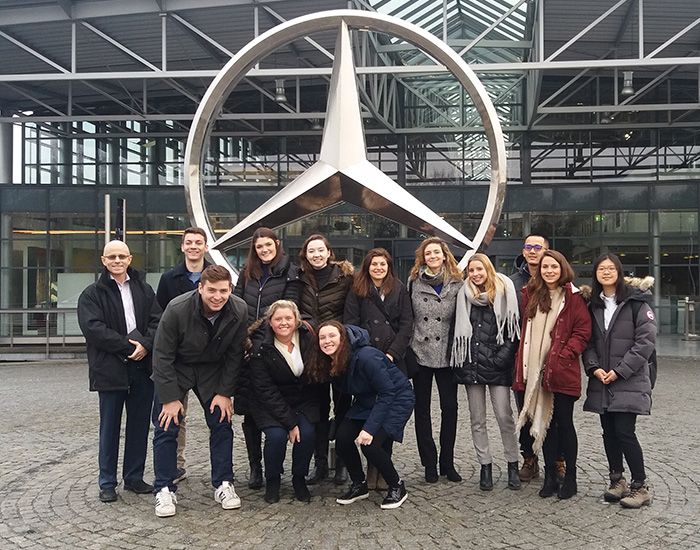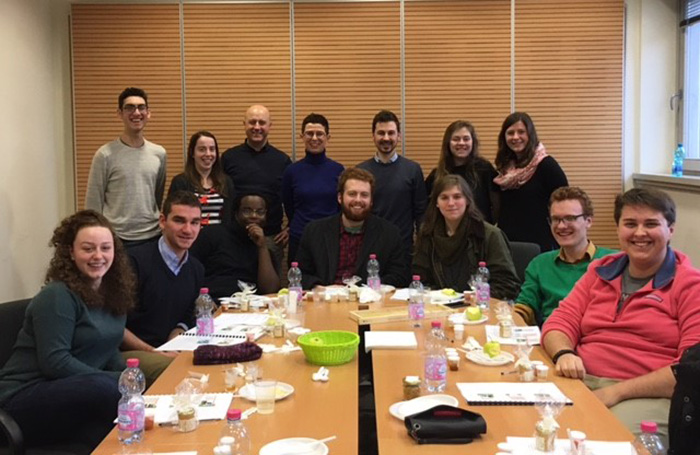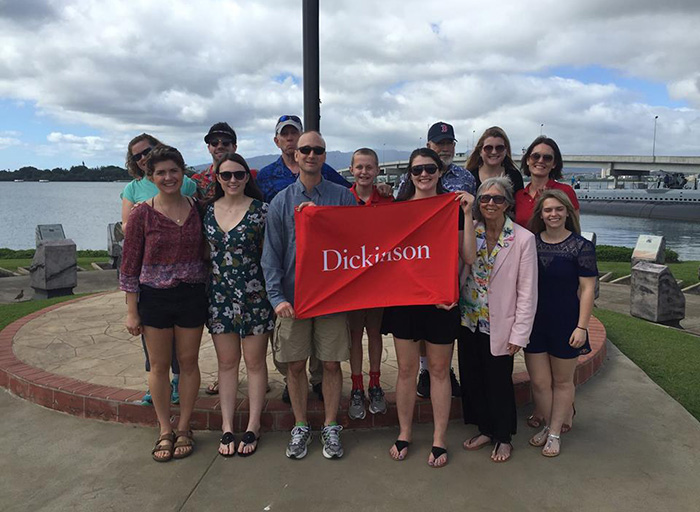The Learning Continues

Students taking a class on global human-relations practices visited the largest Mercedes Benz plant in the world during a winter break trip to Germany and Denmark.
Courses link classroom study with overseas fieldwork, research
by MaryAlice Bitts-Jackson
For many, spring and winter breaks are times to connect with family and friends and catch up on Netflix and pleasure reading, or maybe take on an internship, trip or monthlong job. But for students taking globally integrated courses this year, the break is a time to build on what they're learning in class.
Semesterlong classes that center on a global issue or theme, globally integrated courses link traditional, classroom-based study with research or fieldwork completed during the academic-year break.
Steve Riccio, lecturer in international business & management, took 12 students to Copenhagen, Denmark, Jan. 3-8, and to Bremen, Germany, Jan. 8-17 to study recruiting, retention, performance management and employee relations practices in those countries. The students will take a human-resources management course during the spring 2018 semester, during which they'll study and visit American companies.
While abroad, the students met with human-relations professionals and learned from faculty members in each country who could offer a broader understanding of how culture informs business environments and strategies in Germany and Scandinavia. The overseas fieldwork included stops at two Mercedes-Benz plants, one of which produces 427,000 vehicles every year.
"It was so cool to see the machines working together to make the basic model of a car along the assembly line," said Jinglei "Lesly" Liu '20, a double major in mathematics and international business & management who hails from China and counted the Mercedes-Benz visits as a highlight of the trip. "Visiting places of business definitely helps deepen my understanding of business practices, because I can see and feel the working environment and talk to professionals, ask questions, see how they deal with different situations and learn how they recruit, train and keep talented employees."

Students in Luca Trazzi's Italian globally integrated course studied sustainable food systems in Italy.
Italian-language students read, wrote and held discussions in Italian as they studied the intersection of Mediterranean culture, food culture and sustainability with Lecturer in Italian Luca Trazzi during a two-week trip to several major Italian cultural centers. The Jan. 6-18 trip was supported by Suzanne Gouvernet P’00, who recently established the Sustainability Education Abroad Fund.
These students investigated organic food production in Florence; learned about watersheds, natural preservation, beekeeping and Renaissance dining culture in Mantua; visited a global-foods farmers market in Rome; investigated sustainable wine production in Chianti; and went off the tourist’s path again in Venice, this time visiting farmers markets and green parks along with craftsmen’s and fair-trade shops as well as sustainable eateries. In Bologna, they connected with Sylvie Davidson, professor emerita and former head of the Bologna Center, and toured an organic bistro/collective garden, working space and educational venture with Delphine Dall’Agata ’17, who’s serving an Italian internship. And, as in every city they visited, the students also sampled local and regional foods and discussed Italian gastronomic culture.
Experiences like these are a hallmark of Dickinson's global education programming. Last spring, Spanish-language students studied environmental issues in contemporary Chilean literature by visiting the land that produced it, while Dickinsonians studying theatre & dance learned from the pros in New York City. Policy studies students compared and contrasted health policies in the United States, Japan and Israel, and interviewed patients and health practitioners in all three places.
And globally integrated courses are just one of the ways that Dickinson students brought the world into their classrooms and their classroom study into the world during the winter break.

Dickinsonians learned about military history and strategy at the site of the 1941 attack on Pearl Harbor.
Following on the heels of a popular 2017 trip to Oahu, Hawaii, students learned about crisis leadership with Jeff McCausland, visiting professor of international security studies, former dean of the U.S. Army War College and founder/CEO of Diamond6 Leadership & Strategy, by investigating the military concepts and principles behind the 1941 attack on the Pearl Harbor Naval base at the site where it occurred. The trip to Hawaii included visits to the Pacific Aviation Museum on Ford Island in Pearl Harbor, the World War II Valor in the Pacific National Monument and the USS Arizona Memorial, as well as a chance to meet alumni interested in military history and international affairs relating to one of the most important crises in American and global history.
Watch videos of the Snapchat takeovers from the trips to Germany, Italy and Hawaii.
TAKE THE NEXT STEPS
Published January 22, 2018